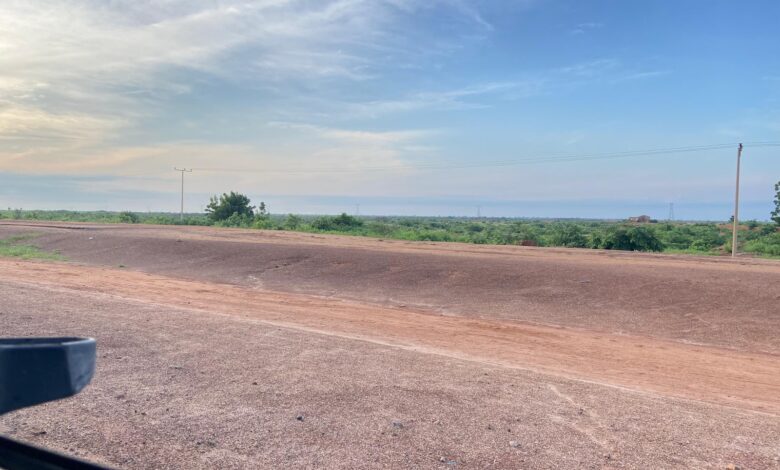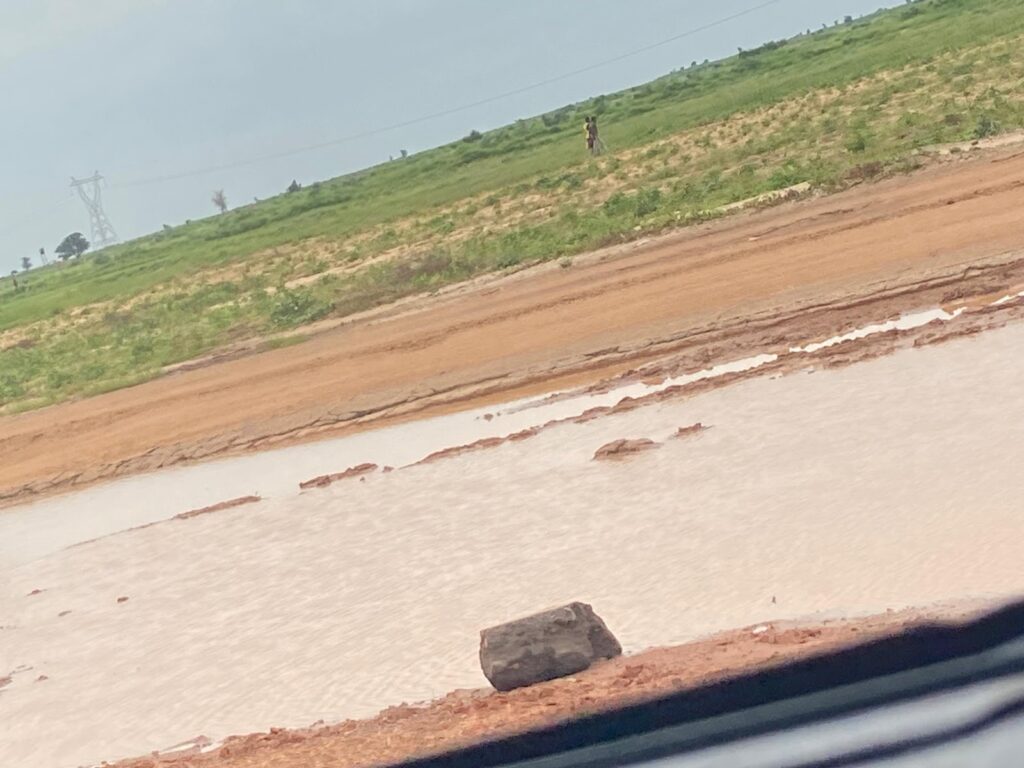‘A Death Trap’: Commuters Frustrated Over Abandoned Maiduguri-Damaturu Highway Project
Promised as a pathway to economic growth, the Maiduguri-Damaturu highway now stands as a testament to neglect. For residents, drivers and passengers alike, every journey is fraught with potholes, delays, and the looming shadow of tragedy.

On a warm afternoon in April 2023, Audu Bala, a 50-year-old commercial driver, gripped the steering wheel of his car tightly while driving from Maiduguri to Damaturu, the capital of Yobe State in northeastern Nigeria. His vehicle, packed with passengers, veered into a collision while he swerved to avoid a pothole on the partially completed highway.
The accident was fatal. It left Bala alive but scarred, both physically and emotionally. The other driver didn’t survive. “This uncompleted road has caused many deaths in this community,” Bala told HumAngle, as his face beamed with a reflective melancholy atmosphere.
He also noted that accidents are not the only hazard commuters face on the route. Although less frequent than in the past, attacks by terrorists remain a looming threat.
A route of broken promises
The Maiduguri-Damaturu road forms part of a larger federal contract awarded in 2006 to the China Civil Engineering Construction Corporation (CCECC) through Yaroson Partnership Ltd. The project, overseen by the Federal Ministry of Works and Housing, aimed to dualise the Kano-Maiduguri Road.
Classified as Section 5 of the broader project, the Maiduguri-Damaturu stretch covers 131.9 kilometres, with an additional 13.4-kilometre bypass around Damaturu, bringing the total to 145.1 kilometres. It was envisioned to enhance connectivity between Borno and Yobe States, offering safer, faster travel and fostering regional economic growth.
Documents obtained by HumAngle reveal the project was initially budgeted at ₦39.9 billion, with a completion deadline of December 2009. But the reality today stands in stark contrast to these lofty goals. What was meant to be a modern, efficient highway is now a crumbling expanse of asphalt and gravel, riddled with gaping potholes that have earned it the grim nickname of a “death trap” from residents and commuters alike.
Despite recent budgetary allocations, progress has stalled—₦7.9 billion in 2022 and an additional ₦4 billion in 2023. A visit in November 2024 revealed abandoned equipment, unfinished stretches, and worn-out sections barely fit for use.

Lives on the line
For those who depend on the Maiduguri-Damaturu road, its poor condition is more than an inconvenience—it’s a threat to their lives and livelihoods.
Every week, A’isha Bala, a 30-year-old businesswoman based in Damaturu, travels through the route once to buy goods for her shop. However, the poor road condition causes her stress and jeopardises her business.
“There have been instances when after I got my goods from Maiduguri, the car I hired tumbled in the process of moving from the uncompleted part to the completed,” she told HumAngle. “It’s disheartening to witness the negative impact of this project delay on the well-being of our community. The road conditions make it extremely challenging for the growth of my business.”
For drivers like Babagana Umar, a 35-year-old Maiduguri resident of Maiduguri, the road is a constant source of anxiety.
“It’s been a real challenge. I’m a driver, and I rely on being able to transport passengers from Damaturu to Maiduguri market. But with the road in such poor condition, it’s become almost impossible to carry much load in a day because I spend many hours on the road. It’s affecting my income and ability to provide for my family,” he said.
The delays also affect farmers like Muhammad Issah, a 40-year-old Damaturu resident who depends on the road to transport his produce. “I wish one day the government or the contractor would come and repair the road for us to ease the transportation of agricultural products,” he said. “Right now, it feels like we’ve been forgotten.”
Government defends delays
When asked about the slow pace of the project, Amos Tongman, the Federal Controller of Works in Borno State, cited insecurity and inflation as the major hurdles. “The local contractor has faced delays in disbursements, which have slowed progress,” he said.
Data obtained from GovSpend, a local platform that tracks and analyses federal government expenditures, revealed that between 2018 and 2024, the Federal Ministry of Works and Housing disbursed at least ₦1.161 billion to Yaroson Partnership Ltd. and China Geo-engineering Corporation (CGC) Nigeria Limited for the project. The most recent payment, according to GovSpend, was made in March 2024.
Tongman explained that reliance on periodic disbursements was a key challenge. “The contractor handling the project is a local contractor who has to wait for the disbursement of money before he can work on the site,” he said. “This is one of the problems setting back the project.”
However, he noted that the government remains committed to completing the project. “The new administration [referring to Bola Tinubu’s presidency] has set up a panel to review abandoned projects and ensure their completion. I assure you that the contractor will return to the site soon to continue the work,” Tongman added.
However, commuters remain sceptical. Efforts to reach CCECC and Yaroson Partnership Ltd. for comments were unsuccessful, as neither spokesperson responded to calls or messages at the time of this filing report.
Legal expert Isah Musa weighed in on the contractual implications of the delays.
“Public procurement laws stipulate penalties for violations by either party,” he said. “If the delay is caused by the government, the contractor is entitled to extensions. But if it’s the contractor’s fault, the government can claim damages for the inconvenience caused.”
For now, the road’s future remains uncertain. Meanwhile, commuters on the route continue to pay the price—through missed opportunities, economic struggles, and, tragically, lives lost.
As dusk falls on the Maiduguri-Damaturu highway, its fractured surface becomes harder to navigate. The journey is more perilous in the dark, but the road tells its own story— one of broken promises, dashed hopes, and a community waiting for its government to deliver on its word.
This report was produced as part of the 2024 HumAngle Accountability Fellowship, with support from MacArthur Foundation.
The Maiduguri-Damaturu highway project, initiated in 2006 to improve connectivity in northeastern Nigeria, remains incomplete, posing severe safety risks and economic challenges for commuters.
Initially budgeted at ₦39.9 billion with a 2009 completion goal, the project has stalled despite recent funding due to issues like insecurity and inflation.
The road is plagued by potholes, earning it the nickname "death trap," causing fatal accidents and affecting local businesses and livelihoods.
Federal authorities attribute the delays to slow disbursement of funds, while a panel under the current administration aims to address the backlog of incomplete projects. Meanwhile, residents remain skeptical about government promises, facing continued economic hardship and safety risks on the deteriorating roadway. Legal experts highlight potential contractual penalties depending on whether the delays are deemed the fault of the government or contractor. The community awaits tangible action to prevent further losses and deliver long-promised infrastructure.
Support Our Journalism
There are millions of ordinary people affected by conflict in Africa whose stories are missing in the mainstream media. HumAngle is determined to tell those challenging and under-reported stories, hoping that the people impacted by these conflicts will find the safety and security they deserve.
To ensure that we continue to provide public service coverage, we have a small favour to ask you. We want you to be part of our journalistic endeavour by contributing a token to us.
Your donation will further promote a robust, free, and independent media.
Donate HereStay Closer To The Stories That Matter




